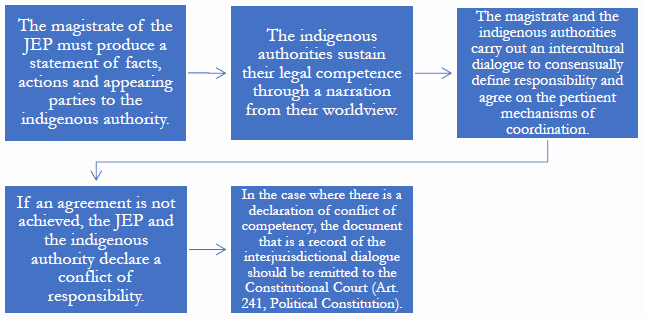
This bulletin concerns the legal framework for the application of the ethnic focus in the Special Jurisdiction for Peace (JEP - Jurisdicción Especial para la Paz).
 Newsletter No 7. Observatory on the SJP
Newsletter No 7. Observatory on the SJPNewsletter No 7. Ethnic Focus in the Special Jurisdiction for Peace
Unofficial translation by ABColombia in collaboration with 'Volunteer Student Translators from Bristol University: Lucy Courtnall, Ami Houlbrook, Lottie Sinclair
This bulletin concerns the legal framework for the application of the ethnic focus in the Special Jurisdiction for Peace (JEP - Jurisdicción Especial para la Paz). The ethnic focus is one of the guiding principles for the implementation of the Peace Agreement. In particular, the Peace Agreement, in its Ethnic Chapter, established that the that the JEP must incorporate an ethnic and cultural perspective and respect the right to participation and prior consultation with indigenous peoples where appropriate. In addition, it noted that the JEP should create mechanisms for articulation and coordination with the Special Indigenous Jurisdiction.
Following the Peace Agreement, the rules implemented by the JEP include measures and mechanisms aimed at guaranteeing the implementation of the ethnic focus. Among them, the following stand out:
|
The JEP should apply the ethnic focus to all its actions and implement mechanisms of interjurisdictional coordination and dialogue. |
Figure 1. The Stages of the Interjurisdictional Dialogue between the Special Jurisdiction for Peace (JEP) and the Special Indigenous Jurisdiction in order to resolve conflicts of responsibility.

(Source: Protocol 001 of 2019 from the Ethnic Commission)
Figure 2. Mechanisms for articulation and coordination with the Special Indigenous Jurisdiction
| Intercultural and interjurisdictional communication. The bodies of the JEP have a duty to promote intercultural and interjurisdictional communication with the ethnic authorities, especially in order to make agreements about carrying out actions in collective territories. | Notification to the Indigenous authority. When the bodies of the JEP are made aware of cases involving indigenous peoples, they must notify both the person and their Indigenous authority. They must use effective mechanisms that address the geographical reality and the cultural affiliation, ensuring access to advice and guidance. |
| Withdrawal of the Indigenous authority’s jurisdiction. When the JEP notifies an Indigenous authority that is, or was, involved in a past or present case, they must state whether they relinquish jurisdiction over it. The JEP must grant them reasonable and appropriate time to make this statement. | Accompaniment to the Indigenous authority. In the case that the appearing party or the victim request the presence of the corresponding Indigenous authority, the JEP must guarantee this. |
| Centres for indigenous harmonisation and equivalent Institutions. The bodies of the JEP can impose sanctions to be implemented in the centres for indigenous harmonisation, once the ethnic authorities have given their consent. The JEP must offer the necessary support to guarantee the conditions of the sanction agreement and supervision over it by the indigenous authorities. | Cultural harmonisation. When the bodies of the JEP are made aware of cases that involve appearing parties who belong to indigenous populations, they must request the presence of an ethnic authority that understands the conditions of the concepts of harmonisation, admission and permanency in the ethnic territory established in their Justice System. In the cases in which it falls to the JEP to impose sanctions on the appearing party, and were these sanctions should be developed in the ethnic territory, the JEP must solicit the ethnic authority’s consent. |
| Handling of evidence in ethnic territories. The JEP will arrange the conditions and types of support for the collection or handling of evidence in ethnic territories with the ethnic authorities. | Reintegration. The ethnic population can apply harmonising processes to members and their communities that may have completed the imposed sanction for the JEP outside of their ethnic territory. |
(Source: Internal Regulation of the JEP)
Ultimately, the JEP has the obligation to apply the ethnic focus to all its proceedings and should implement the necessary mechanisms for this. As observed, the legal framework implemented by the JEP contains distinct procedures that have already been put into effect. In the next bulletin we will analyse theOrders 079 from 12th November 2019 and 2nd and 27th January 2020, decisions made by the Recognition Chamber which supports the application of the ethnic focus through the recognition of the territories of indigenous Peoples as victims evidence.